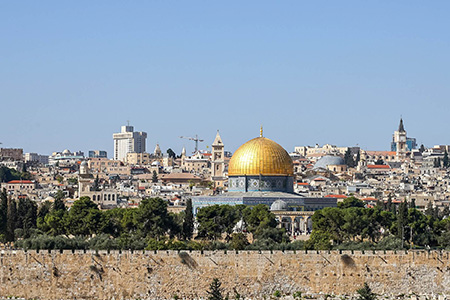“Were not our hearts burning within us while he spoke to us on the way and opened the Scriptures to us?" the two disciples wondered out loud after a mysterious encounter with the risen Christ on their way from Jerusalem to Emmaus (Luke 24:32).
For people who have the blessing of encountering Christ through the Scriptures, the way from Jerusalem to Emmaus is a powerful spiritual journey they traverse often. It is heavenly to hear the divinely inspired word directly from the mouth of Christ who, as the Word of God, embodies the sacred Scriptures, and is the only “one in heaven or on earth or under the earth” capable of opening the sacred scroll (cf. Rev 5:3-5). They hear, as Pope Benedict XVI articulated it with so much eloquence, “a polyphonic hymn”, “a single word expressed in multiple ways”, a “symphony of many voices in which the one word is spoken” (Verbum Domini 7). No wonder the two disciples found their hearts “burning” during the mysterious encounter!
Jerusalem is a city of dejection and danger for the two disciples. Their conviction that they have finally found the Messiah in Jesus the Nazarene has just been crushed and shattered into pieces when he died like a criminal on the cross. And the Roman authority and the Sanhedrin are aggressively hunting down his followers. But now they are hearing that he might still be alive, and that his tomb was found empty. What’s really going on? It’s nothing but heartache, confusion, and fear.
Unfortunately, the “Jerusalem heartache” that haunted the two disciples is in many ways also haunting all of us. Every descendent of Adam and Eve living in a world order deprived of its original innocence and holiness because of our first parents’ unbelief and disobedience must experience it again and again. Sometimes, it seems there’s just no breaking away from Jerusalem!
But the loving Father will not leave us hopeless and despondent. For every heartache or confusion or fear that we experience in the Jerusalem of our hearts, there is always hope that a joy or enlightenment or comfort is out there waiting to be found - if only we have the courage, the will, and the resilience to turn our back on Jerusalem and set out for Emmaus, as the two disciples did. Where is Emmaus? A Judean village of uncertain location according to Ignatius Catholic Study Bible. But it doesn’t matter where it is really. What matters is that somewhere out there, away from Jerusalem, there is hope, there is an opportunity to start anew, there is…Emmaus.
On their journey in search of hope and comfort, they encounter the risen Lord, who enlightens them and makes them understand that it is “necessary that the Christ should suffer these things and enter into his glory” (Lk 24:26). How does Jesus do that? Using the sacred Scriptures. “Beginning with Moses and all the prophets, he interpreted to them what referred to him” (Lk 24:27). In other words, he gives them a crash course on the whole salvation history, how it progresses from Moses and the prophets to Christ; from the law as our disciplinarian to faith as fulfillment and justification; from, in a word, the Old Covenant to the New (cf. Gal 3:24-25). What a rich and profound scriptural discourse that must have been!
As rich as the scriptural discourse is, Jesus does not stop there. He goes on to share a meal with them. What happens next is a sequence of actions reminiscent of what he did at the Last Supper: “he took bread, said the blessing, broke it, and gave it to them” (Lk 24:30, 22:19). Clearly, this is no ordinary meal. It is the Eucharistic liturgy! It is only then that the “[disciples’] eyes were opened, and they recognized him” (Lk 24:31) The road to Emmaus is in fact a Mass liturgy in which Jesus gives himself to the Church in word and in Sacrament (the Eucharist); it is the miniature of the Mass liturgy, beginning with the liturgy of the Word and ending with the liturgy of the Eucharist. The Church’s response to Christ’s self-emptying, as shown by the two disciples, is thanksgiving expressed in the form of “heart burning” on hearing the word and “eyes opened and see Jesus” on receiving the Eucharist.
But it’s at this point, just when the disciples have heard the word and received the Eucharist, that the most amazing thing happens: “So they set out at once and returned to Jerusalem” (Lk 24:33)! They can’t wait to return to Jerusalem, the city of heartache and danger, the awful place that they’ve tried to run away from. Why? The Good News that they’ve heard and the best meal that they’ve ever had have permeated their whole being with great joy and a compelling sense of mission. They can’t wait to return to Jerusalem to serve the Lord and help people entangled in the Jerusalem heartache. So must we do the same after hearing the word of God and receiving the Eucharist at Mass. This is what the Church asks of us when the priest concludes the Mass celebration with this simple commissioning: Go forth, the Mass is ended; “Ite Missa est” (cf. Pope BXVI, Sacramentum Caritatis 51).
